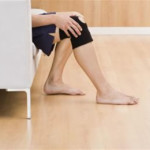Different Causes and Treatments of Paresthesia!
Have you ever heard about paresthesia? Well … It’s perfectly normal to experience mild symptoms of paresthesia from time to time. But when these symptoms occur too often, chronic, or last longer than usual – don’t choose watchful waiting, see a doctor promptly!
In general, paresthesia is characterized by a sensation of numbness, burning, tingling, or tickling. It is also familiar known as pins and needles.
Sometimes it is also described as the feeling of a limb –falling asleep. In many cases, its manifestation is transient (temporary). But if it is chronic or long-lasting, this may signal a health condition that may require prompt treatment.
Does paresthesia go away on its own?
Again, most cases of paresthesia are temporary – and for this case, you don’t need to worry because most people can have temporarily numbness and tingling that will go away naturally. But when it is chronic (often come & go -or long lasting), it is now considered as a health issue and should not be ignored.
So if you have a sensation of numbness & tingling or other symptoms of paresthesia and they last longer than usual (chronic) – see a doctor to find help!
What are the most common causes of persistent paresthesia?
For transient symptoms, feet and hands are common part of the body where the symptoms occur. They can happen when there is unusual pressure (particularly prolonged pressure) that applied to the nerves of hands, feet, or other sites – such as when kneeling too long, etc! As a result, this can block the blood flow to the nerves of the affected site and then you may find some discomforts such as pins and needles.

The transient symptoms can be relieved easier. Just take the pressure off from the affected area, and they will go away on their own after a couple of minutes once the blood supply to the nerves backs to normal.
In case of persistent /chronic paresthesia, it can be caused by a wide range of disorders and diseases – from orthopedic factors to neurological problems affecting the nerves.
The following are some health conditions that can be potential to cause neurological problems which then can lead to chronic paresthesia:
- Type-2 diabetes! One of major complications from this disease is a condition called diabetic neuropathy.
- Multiple sclerosis (MS) – find more detailed information about paresthesia in multiple sclerosis on this section.
- Certain health conditions that cause inflammation in the spinal cord, such as transverse myelitis and peripheral neuropathy.
- Stroke.
- Brain tumor.
- Poisoning, such as heavy mental poisoning.
- Inflammation in the brain due to bacterial or viral infection that affects the nerves, such as encephalitis.
- Rheumatoid arthritis or other connective problems.
- Lyme disease or other infections.
- Problems of blood vessels.
- Inflammation that directly affect the nerves, such as neuritis.
- Etc.
And for orthopedic causes, these include:
- Carpal tunnel syndrome or other kinds of nerve entrapment.
- Degenerative disk problem.
- Neck /back injury.
- Osteoporosis or other bone fracture problems.
- Herniated disk.
Sometimes abusing alcohol (excessively consumption of alcohol) and poor diet (particularly too low in vitamin B12) may affect the nerves, too!
The treatment will depend on the cause. Therefore, it is very important to clearly identify the exact reason (underlying condition) of the problem. Once the cause is found; your doctor can determine the most appropriate, comprehensive treatment plan.
Again the cause can significantly affect the prognosis of the problem. The following are some examples:




I get a burning, tingly stinging sensation on my back, (upper) with a almost throbbing tense discomfort back of my legs, just at the top below my buttocks. Its only when I’m fighting a bad cold. Generally its before the cold gets bad, (like at the start of a cold, but I know its going to be a long lasting one, and bad when I do get this burning skin feeling) I don’t always get it before I;m going to get sick tho. And longest its lasted is two days. The touch of my clothes on my skin is the worst. if I where to just take them off and stand naked without anything touching my skin its not as bad. Light touch is when it burns and tingles the worst, hard touch no. Would this also be a form of parethesia. I’ve talked to Dr’s in the past about this, and they look at me like I’m crazy.
I have chronic paresthesia on my entire right side due to a traumatic brain injury to the left side of my brain and its driving me crazy. Gabapentin had no effect so I’m wondering if Lyrica or some other drug would help me